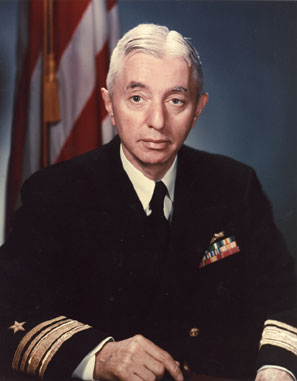In January 1982, Admiral Hyman G. Rickover, approaching retirement as director of the U.S. Navy’s nuclear reactors and as irascible as ever, appeared before Congress for the last time. His testimony was full of blunt observations, none as cutting as his take on certain public servants. “I have an expression—the ‘Say-Do,’” the 82-year-old Rickover declared. “People say something and the newspapers laud them, before they’ve done a damn thing and then they never do it and then they go on to some other Say-Do thing, and they get more credit.” Detested by some, idolized by others, Rickover was, without a doubt, a doer. And he had little time for those who weren’t.

As a terrific new PBS documentary reveals, Rickover’s life was one of great consequence. His accomplishments were technologically towering; his means of accomplishing them unorthodox bordering on unbelievable. It was Rickover, pushing back against skepticism if not outright opposition, who envisioned and realized the world’s first nuclear submarine—the U.S.S. Nautilus—and charted the civilian use of atomic energy. On paper, it’s fascinating. But on screen, Rickover’s life crackles, thanks to the sure hand of director Michael Pack.
For over a decade, Pack has quietly modernized the historical documentary, finding unconventional and often surprising ways to interpret and understand his subjects. Rickover: The Birth of Nuclear Power continues the trend. Archival footage and recollections of those who knew and worked for the man mingle with short, dramatic reenactments. The admiral comes to life via actor Tim Blake Nelson’s ornery portrayal. Like scenes from Pack’s films on George Washington and Alexander Hamilton, which place those two founders in strikingly modern contexts, the technique is, initially, jarring. But it grows on the viewer, and by the time the credits roll, we are left with an intimate understanding of the man.
Born Chaim Godalia Rickover in eastern Poland during the reign of Tsar Nichols II, Rickover migrated west to Chicago with his mother in March 1906. A 1922 graduate of the Naval Academy, Rickover faced anti-Semitism. His page in the school’s yearbook was perforated for easy removal, as was that of the other Jewish student in his class. Years later, many of his classmates would seek the admiral’s assistance. Rickover wouldn’t lift a finger for the “bastards.”
An engineering prodigy, Rickover spent most of World War II accumulating technological know-how, serving on small ships at out-of-the-way posts. After the war, he volunteered to travel to Oak Ridge to investigate the possibility of a nuclear plant, an experience that sold him on the idea of employing that same energy source to power submarines. The Nautilus was christened in 1954. The first atomic power station in Shippingport, Pennsylvania, went online in 1957. These projects were milestones for mankind, willed into being by Rickover’s tenacity.
Rickover was arrogant and a fanatical perfectionist. With staff, he was confrontational and occasionally abusive. He forced engineers to work ungodly hours. He often humiliated midshipmen who hoped to join his team, forcing them to sit on crooked chairs and assaulting them with uncomfortable questions in interviews. He ordered one candidate to phone his fiancée in order to postpone their wedding (to allow for more time to assist Rickover), only then to dismiss the young fellow for acquiescing so readily to the admiral’s unfair request. As bizarre as these techniques sound, they helped Rickover surround himself with a team that suited his needs, among them future president Jimmy Carter and the recently deceased nuclear engineer Ted Rockwell. Both appear in Pack’s film.
Rickover’s unpopularity with Navy brass never bothered him. Combining an obsessive hatred of bureaucracy with a passion for efficiency, he plowed ahead. There were no rules he wouldn’t break, and no process he wouldn’t economize. Phone calls to employees monitoring reactors, for example, were brief. Rickover felt “I have nothing to report” took too long to say, so he reduced it to a single word: “nothing.” But even that was too wordy for Rickover, and subordinates eventually were told to shout “no” into the phone if they had no news to share. Despite the emphasis on economy, Rickover was anything but relaxed about the security on his ships or at his facilities. He scrutinized every document and obsessively monitored safety.
This is an inspiring story, a reminder of the human ability to accomplish astonishing things in the face of hostile opposition, both human and institutional. But there is also an element of melancholy in Pack’s tale. In the mid-twentieth century, nuclear power was less feared than it is now. That changed as the Cold War wore on. The 1979 meltdown at Three Mile Island soured the public on nuclear energy. Rickover’s waning influence in Congress, and an ongoing battle with defense contractors whom he accused—correctly, as time would reveal—of over-charging tax payers, eventually spelled the end for the admiral.
In 1982, Navy leadership decided to remove Rickover from his command. The great man was reduced to an advisory role. This news, which the admiral heard first on television, was officially relayed in an Oval Office meeting. Furious and hurt, Rickover minced no words with President Ronald Reagan, demanding to know why he was being fired, and telling the president to “cut the crap.” Reenacted here, it’s an electrifying scene, testament to the filmmaker’s assured hand and his subject’s bewildering pluck.
Hyman Rickover remains a polarizing figure. As this film makes clear, however, his methods were revolutionary and his accomplishments were monumental. Owing to his unpopularity with many in the military, Rickover never got proper credit during his lifetime for all he achieved. Happily, Michael Pack has rectified this.